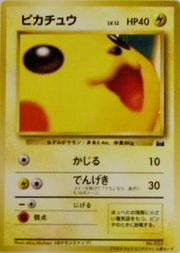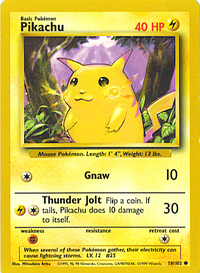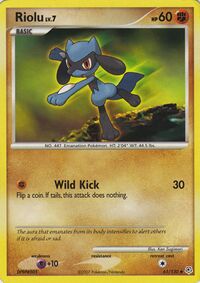From Bulbapedia, the community-driven Pokémon encyclopedia.
Pikachu LV.12
ピカチュウ Pikachu
|

|
|
|
|
| Japanese Deck Kit
|
Intro Pack
|
| Japanese Deck
|
Bulbasaur Deck
|
| Japanese card no.
|
13
|
|
|
| Expansion
|
Base Set 2
|
| Rarity
|

|
| English card no.
|
87/130
|
|
|
| Japanese Deck Kit
|
Intro Pack Neo
|
| Japanese Half Deck
|
Totodile Half Deck
|
| Japanese card no.
|
1
|
|
|
| For more information on this Pokémon's species, see Pikachu.
|
|
Pikachu (Japanese: ピカチュウ Pikachu) is a Lightning-type Basic Pokémon card. It was first released as part of the Base Set.
Card text
Initial prints

|
Gnaw
かじる
|
10
|
|
|
|
 
|
Thunder Jolt
でんげき
|
30
|
|
| Flip a coin. If tails, Pikachu does 10 damage to itself.
|
|
Pokédex data (Base Set and Base Set 2 prints)
Pokédex data (Rising Rivals print)
| Pikachu - Mouse Pokémon
|
| No.
|
Height
|
Weight
|
| 025
|
1'04" (0.4 m)
|
13.2 lbs. (6 kg)
|
| Pokédex entry
|
| It has small electric sacs on both its cheeks. If threatened, it looses electric charges from the sacs.
|
| ほっぺたの りょうがわに ちいさい でんきぶくろを もつ。 ピンチのときに ほうでんする。
|
Pokémon Trading Card Game Classic print

|
Gnaw
かじる
|
10
|
|
|
|
 
|
Thunder Jolt
でんげき
|
30
|
|
| Flip a coin. If tails, this Pokémon also does 10 damage to itself.
|
|
Pokédex data (Pokémon Trading Card Game Classic print)
Release information
This card was included in the Base Set with artwork by Mitsuhiro Arita, first released in the Japanese Expansion Pack. It has two versions: a red-cheeked variant and the true yellow-cheeked version. The split between red cheeks and yellow cheeks is estimated to be 50% in 1st Edition and Shadowless print runs; however, the Unlimited print run only features the yellow cheeks version making the red cheeks version more sought after. Both versions also have promotional variants with a gold foil "E3" stamp where the expansion symbol would be present in subsequent sets. The yellow-cheeked version was available as an insert in the September 1999 issue of Nintendo Power, while the red-cheeked variant was distributed to those who visited the Nintendo booth at the Electronic Entertainment Expo (E3) between May 13 and 15, 1999. Similarly to the non-promotional versions, the red-cheeked variant is considerably more valuable.
The yellow-cheeked version of the Base Set print also has another promotional variant with a gold foil "PokéTour 1999" stamp in the top right corner of the illustration. This card was included in 'Tour packs' distributed at locations visited by the PokéTour in Australia in 1999, which were advertised to be limited to 3,000 at each venue. The PokéTour consisted of two separate tours: Red, which ran on weekends from September 18 to October 9, 1999; and Blue, which ran on weekends from September 18 to October 7, 1999. A Jumbo version of the yellow-cheeked Base Set print was included with the February 2000 issue of Top Deck Magazine. This print has "Not for Play Use" in red on the reverse of the card. A Korean version of yellow-cheeked Base Set print was also included in the Pikachu World Collection, available to purchase exclusively at Pokémon Park 2000 held at Sydney University, Sydney, Australia from September 12 to October 4, 2000. This print features a gold foil Pikachu tail stamp on the left edge under the illustration window.
In Japan, it was reprinted as an Unnumbered Promotional card with artwork by Mina Akuhara, one of five winning entries of the CoroCoro Pokémon Snap Best Photo Contest, which was held between May 15 and June 14, 1999. This print has a camera graphic in place of an expansion symbol and text on the bottom of the card border that reads: ""Best Photo Contest" winning card". According to the article in the August 1999 issue CoroCoro Comic that announced the winning entries, each entrant was to receive twenty copies of a card featuring their photograph.
An English version of the yellow-cheeked Base Set print on Japanese card stock was included in the Pokémon Song Best Collection CD, released on January 1, 1999. The yellow-cheeked version of the Base Set print was reprinted in the Bulbasaur Deck of the Japanese Intro Pack, in the Base Set 2 expansion, and in the Totodile Half Deck of the Japanese Intro Pack Neo.
This card was later reprinted in the POP Series 2 with new artwork by Yuka Morii, first released as one of the Japanese PCG-P Promotional cards. In Japan, it was available as part of a Meiji Chocolate campaign in June 2005. A special reprint was included in the Rising Rivals expansion with redrawn art by Mitsuhiro Arita, first released in the Japanese Bonds to the End of Time expansion.
Another Jumbo version of the yellow-cheeked Base Set print was included in copies of the First Partner Collector's Binder, released on February 26, 2021 in celebration of the 25th Anniversary of the Pokémon franchise. This print lacks the Wizards of the Coast copyright and features a foil Pokémon 25th Anniversary logo in the bottom right corner of the illustration window.
In the Scarlet & Violet Series, this card was reprinted in Holofoil with its original Base Set artwork for the Charizard & Ho-Oh ex deck of the Pokémon Card Game Classic. This reprint lacks a regulation mark and is thus not legal for tournament play.
Gallery
Trivia
- This card is popularly known as Yellow Cheeks Pikachu as a reference to the card's artwork and to differ it from Pikachu card from the Jungle expansion. This name also appeared in some instruction manuals produced by Wizards of the Coast.
- The original Japanese version depicts Pikachu with yellow cheeks. However, Wizards of the Coast, when releasing this card for the first time in English, deliberately recolored Pikachu's cheeks red in an effort to make it more recognizable. Wizards would however later reverse this decision in subsequent reprints of the card and return Pikachu's cheeks to their original yellow color; because of this reversal the original red cheeks is commonly mistaken to be an error.
- Although not part of a numbered promotional set, the Pikachu distributed at E3 in 1999 was the first English promotional card.
Origin
Thunder Jolt is a move in the Super Smash Bros. series that Pikachu can use. This card's English Pokédex entry comes from Pokémon Red and Blue, though it is slightly reworded. The Japanese entry comes from Pokémon Red and Green. The Rising Rivals Pokédex entry comes from Pokémon FireRed.








